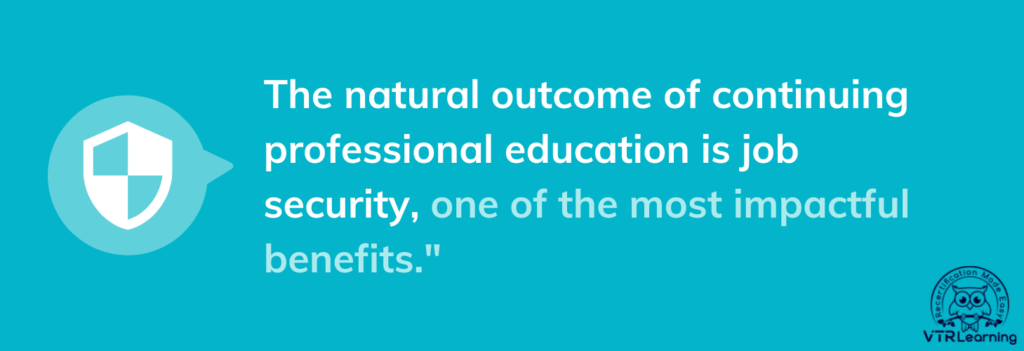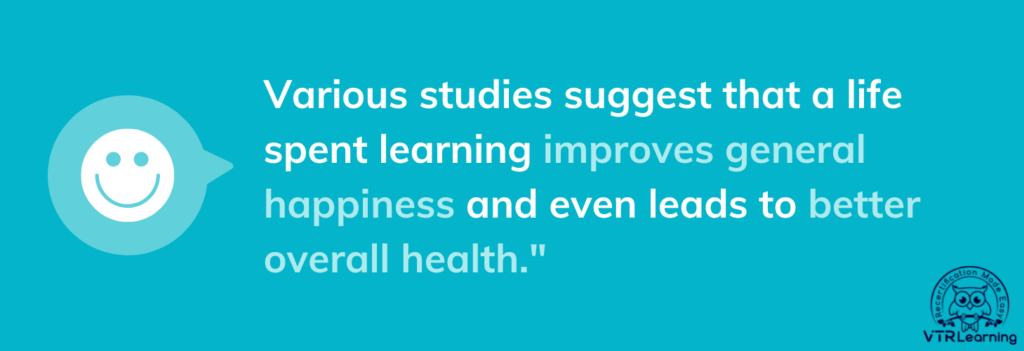![Top Reasons for Continuing Education [5 Key Benefits]](/wp-content/uploads/2021/03/Four-Benefits-of-Continuing-Education.png)
Too often, Continuing Professional Education seems like a hassle. It’s that thing members of organizations like SHRM, HRCI and the AICPA have to complete to retain their licenses. But casting CPE in that light ignores the numerous benefits continuing education can provide, both personally and professionally. After all, the reason certifying organizations require continuing education is because it helps members stay up to date on new trends. It also ensures individuals know the laws that inform their everyday practice. In that sense alone, CPE is immensely beneficial for those working in professional businesses. But practically speaking, studies suggest that general learning improves happiness and even leads to better overall health.
Of course, methods of earning CPE aren’t perfect, and they aren’t free from frustration and confusion. But when taken seriously, professional development can positively impact an individual’s career and contribute to their sense of stability.
The Benefits of Continuing Education
Competence
The first and most recognizable benefit of continuing education is that it helps individuals become more competent. At first glance, this assertion seems matter-of-fact – perhaps even unnecessary. Of course, learning leads to competence. But information retention deteriorates quickly when individuals fail to regularly engage important concepts and ideas.
Maybe a personal example is the best way to demonstrate this concept. I spent four and a half years earning a degree I currently don’t use in any professional way. But I still greatly appreciate and enjoy the ideas and concepts I focused on during my academic career. Because the degree I earned is heavy in theories and arguments, it was extremely difficult to remember some of what I learned after graduation, because I no longer encountered that information regularly. So, when I wanted to pick up books about those concepts later on, I had to reacquaint myself with simple ideas I knew well before.
The point of this story is that maintaining knowledge and skills requires continual immersion in those areas. Even individuals working in specific career fields don’t encounter every concept and idea with regular frequency simply by performing their job. Especially if it is a highly-specified role focusing only on a few key duties.
Alternatively, practices like medical continuing education becomes necessary for the opposite reason. Doctors could encounter any of the various ailments and diseases out there, so understanding symptoms and treatments becomes paramount and even life-saving. Continuing professional education introduces new information to keep individuals competent. But that’s not all. It also facilitates an environment where that information can be cultivated. And of course, competency leads into other areas like problem-solving and innovation.
Networking and Professional Opportunities
A second benefit of continuing education is that it often leads to new connections and career opportunities. Through networking with other professionals, individuals can uncover new opportunities which otherwise wouldn’t have been available. For example, members of SHRM are split into different regional chapters, and a small portion of their CE credit can be obtained by attending events and meetings. Consequently, this encourages members to connect with other professionals and develop relationships that lead to idea sharing. In some cases, these networks ca help members find better job opportunities and tips for advancing their careers.
On a larger scale, most organizations also host regional or national conferences on a yearly basis. At these events, individuals can earn continuing education credit in bulk while encountering people and ideas from different backgrounds. In the same way small-scale chapter meetings facilitate positive interaction, conferences can contribute to networking on a massive scale.
Job Security
The natural outcome of competency and networking is job security, on of the most important benefits of continuing education for business professionals. Here, job security doesn’t have to mean staying with one company for decades, but it could mean that. Simply put, individuals will generally have an easier time finding work because of their heightened skills and networks that can help facilitate job opportunities.

Of course, some situations are uncontrollable, and at times layoffs are inevitable. But even when they occur, those who have poured into their knowledge and skills, who have vast networks, will stand out in a pool of job candidates. Even when job security doesn’t lead to long tenure in one company, continuing education can help secure work quickly when the need arises.
Salary
By now, it should be clear that professional benefits of continuing education are closely interrelated and linked together. After all, if increased competency and networking lead to job security, the next benefit, increased salary, probably connects as well. True, not all companies require continuing education for salary increases. Otherwise, most employees would never get a raise. However, it can be the deciding factor when the choice for promotion falls between two individuals.
Better Self Image
Overall, the prime benefit of continuing education, which all other aspects lead into, is better self image. When professionals have knowledge to back up their skills, they gain confidence. And of course, confidence essentially helps workers to perform at a higher level of capability. Finally, performing at a high level within an organization helps enhance one’s self image. The key, then, is to never stop learning. Because the world of business changes constantly. So, those who want to run ahead and stay ahead have to look forward and see what’s coming at all times.
Personal Health Benefits of Continuing Education
While the previous benefits of continuing education impact an individual’s professional career, they have large implications for personal health. In fact, the very act of learning carries multiple benefits, including improved sleep, stress reduction, and memory loss prevention. The chance of diseases like Alzheimer’s also decreases for individuals who learn throughout their lives. Accordingly, every year of additional education an adult receives after high school reduces the odds of mortality by about 5% annually.
Beyond the physiological effects of continued learning, education typically leads to better job opportunities and health insurance. Naturally, these both make health care more accessible. The American Academy of Family Physicians also notes that higher income makes affording healthier diets and safer homes more possible. So, continuing professional education paves the way not only for economic success but also for a healthier lifestyle.

Find the Right Continuing Education Course Today
Because there are so many different continuing education opportunities available, it’s difficult to know where to get started. But VTR Learning offers online, self-study courses. And they’re quite different from others. Our narrative, story-based learning introduces business professionals to important concepts through a fictional company called Central Products. With this method, they learn business principles by seeing them play out as they would in real life.
Be sure to check out VTR Learning’s full list of self-study courses for members of SHRM, HRCI, AICPA, APA and ASAE!
Last Updated:





